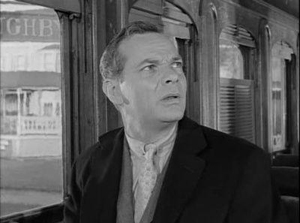This episode of The Twilight Zone was first broadcast on May 6, 1960, and is said to be one of series creator Rod Serling’s favorites. Perhaps that’s because this bittersweet little gem reflected some of the tensions running through Serling’s own real life at the time.
The story focuses on stressed-out (complete with an ulcer) NYC advertising exec Gart Williams (James Daly), and as the pic opens he is seated with several others in a board room. They’re all awaiting the arrival of Williams’ protégé Jake Ross, who is supposed to be bringing in a large automobile account. Instead, they get a belated note that Ross has resigned, and has taken the account to his new firm.
At this, Williams is berated by his boss Mr. Misrell (Howard Smith), who reminds him that advertising is a “push” business. “It’s push, push, push. All the way, all the time…right on down the line.” Shortly thereafter, we segue into Serling’s voice-over:
This is Gart Williams, age thirty-eight, a man protected by a suit of armor all held together by one bolt. Just a moment ago, someone removed the bolt, and Mr. Williams’ protection fell away from him and left him a naked target. He’s been cannonaded this afternoon by all the enemies of his life.
His insecurity has shelled him, his sensitivity has straddled him with humiliation, his deep-rooted disquiet about his own worth has zeroed in on him, landed on target, and blown him apart. Mr. Gart Williams, ad agency exec, who in just a moment will move into the Twilight Zone—in a desperate search for survival.
The scene then shifts to his commuter train home, the New Haven Line, traveling to his stop at Westport/Saugatuck. This being November, it is snowing outside. He drifts off to sleep…
Williams awakes in an old-fashioned train, stopped at a place called Willoughby. The conductor tells him it’s July, 1888, and Willoughby is the town just outside, “…where a man can slow down to a walk, and live his life full measure.” Alas, this was only a dream as he really awakens to be in his familiar New Haven Line train. He tells the present-day conductor he just had a crazy dream, but still inquires about any station stop known to the conductor called “Willoughby.”
As Gart pours himself a drink at home, his none-too-sympathetic wife Janie (Patricia Donahue) having already been apprised of what went on at the office, by “well-meaning” friends. Relieved to find out he wasn’t fired, she accuses him of being in a permanent state of self-pity. Accustomed to her bitchy attitude, he nonetheless tells her a little about his Willoughby dream, and says that he is just not cut out for the big ad agency job or their expensive home, or their country club membership.
Not surprisingly, this goes over like a lead balloon. He truly has no support at home.
A few days have passed. He’s now back on his ride home on the commuter train, and it’s snowing again. In a bit of a tease, the present-day conductor shouts out “Willoughby,” but this was just to get Gart’s attention. He tells Gart that there has never been a stop anywhere near there called “Willoughby.” Gart replies that it was only a dream.
Speaking of dreams, he falls asleep, and sure enough, he’s back on that 1888 train at the Willoughby stop. He decides to disembark, but the train pulls away just before he can. And, he awakens into the present day. But he promises himself that next time, he will get off the train in Willoughby.
The next day, he’s back at work, and nothing seems to be going right. In fact, he cracks. He can’t take it anymore. So, he calls Janie to tell her he’s coming home, but she hangs up on him. Undeterred, he boards his normal train home, and once more after dozing off awakens in Willoughby—with a smile on his face. This time, the conductor beckons him to disembark—and he does, leaving his briefcase on the train.
He is greeted by two boys and a depot bus driver who call him by name. He heads toward the village green and bandstand, the 1880s-era conductor looks at this watch…But then, the scene changes back to the present day. Only now, the train is stopped.
The present-day conductor says that Mr. Williams shouted something about “Willoughby” and jumped off the train, being killed instantly. As the men load Gart’s body into the ambulance, we see the name on the back “Willoughby & Son Funeral Home.”
Serling’s ending voice-over:
Willoughby? Maybe, it’s wishful thinking, nestled into a hidden part of a man’s mind. Or maybe, it’s the last stop in the vast design of things. Or perhaps for a man like Mr. Gart Williams, who climbed in a world that went by too fast, it’s a place around the bend where he could jump off.
Willoughby? Whatever it is, it comes with sunlight and serenity, and is a part of the Twilight Zone.
For May, 1960, this pic was ahead of its time. The discontent was just beginning for the generation that came of age during the war and post-war years. Misrell is surely the miserable boss, and dear Janie’s final hang-up could have been purposely calculated to push Gart over the edge, no doubt with plenty of life insurance, now vested against any suicide exclusion clause.
And the name “Willoughby”? As Serling said, it’s wishful thinking. A sort of foreshadowing of itself, as “Will it be.” Too bad Gart’s “life full measure” meant that he had to die. Quiet desperation, indeed.

